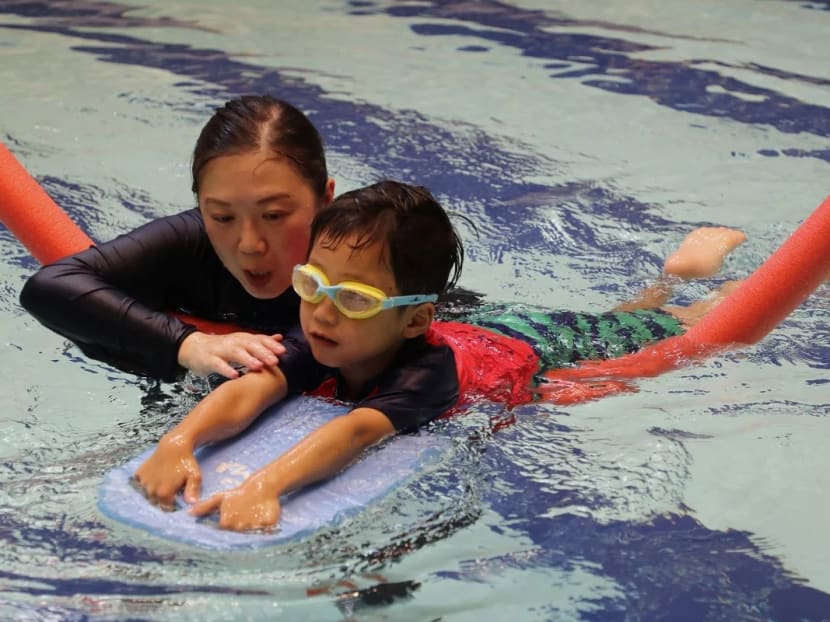New water therapy programme helps children with special needs
HONG KONG — Six-year-old Lucas Mak Chun-wing used to be so afraid of water that even taking a shower could drive him hysterical.

Ms Azura Lo, a physiotherapist, with six-year-old Lucas Mak at a hydrotherapy session at the Heep Hong Society Integrated Service Complex in Sandy Bay.
HONG KONG — Six-year-old Lucas Mak Chun-wing used to be so afraid of water that even taking a shower could drive him hysterical.
But two months of hydrotherapy at the Heep Hong Society in Pok Fu Lam has changed that, and he now enjoys playing with water and even feels calm when submerged.
The weekly sessions with his parents at the children’s education and rehabilitation organisation has made a big difference to Lucas, who was diagnosed two years ago with autism — a developmental disorder characterised by difficulties in social interaction and communication.
“He has overcome his fear of water, and his improvements have made him more confident,” says his mother, Ms Lucia Wong Pui-sze, a clerk in her 30s with a younger son, aged five.
She said showering was especially difficult because the boy’s eyes and ears were so sensitive to water.
Ms Wong and her husband, an engineer in his 30s, had to hold his head to prevent water from touching his eyes and ears.
Lucas also used to fall easily while walking because of his weak physical coordination.
But now he has stronger muscles, his balance has improved, and he controls his emotions better by regulating his breathing, something he learned during hydrotherapy, Ms Wong says.
The sessions include playing games in the water with his parents, using a toy water gun, floating ball and snorkelling tube, guided by a physiotherapist. The activities are designed to help improve his coordination and communication skills.
The Heep Hong Society, which was founded in 1963 and helps children and youth with varied needs, started the hydrotherapy programme in June for those with physical handicaps and autism.
Its hydrotherapy pool is the first in Hong Kong dedicated to children with special educational needs. The 35 sqm pool is between 70cm and 120cm deep, and kept at a temperature of 32 to 34 degrees Celsius.
“Children feel relaxed in water. The buoyancy, pressure, and flow of water feel like massage and make their muscles relaxed,” Ms Winnie Hui Fung-ying, physiotherapist of the Heep Hong Society, says.
“With the instruction of physiotherapists, they can improve their muscle strength and body movement.”
So far, 48 children have joined the centre’s hydrotherapy programme, which comprises 12 one-hour sessions. Depending on each family’s ability to pay, it costs HK$2,550 (S$442.75) or half that price, or may even be free of charge.
The programme will initially run for three years until May 2022 and is expected to benefit 432 children and teenagers up to 18 years old with physical handicaps or autism.
Low-income families, including those on the government’s Comprehensive Social Security Assistance scheme, are eligible for discounts on fees or pay nothing at all.
Hydrotherapy is known to help with pain relief and has mainly been used in hospitals for patients with diseases such as arthritis and rheumatic complaints.
Physiotherapists say the physical properties of water, including the temperature and pressure, are also effective in helping children with physical handicaps and autism by increasing their range of motion in water and improving their heart and lung functions to let them have better control of their bodies and balance.
But paediatrician Dr Henry Yeung warns that hydrotherapy should be carried out under the guidance of professionals in special temperature-controlled pools, to prevent risks such as drowning, especially for young children.
Statistics show that Hong Kong had more than 50,000 students with special education needs during the 2017-2018 academic year. They include children with specific learning difficulties, autism spectrum disorder, intellectual disability and physical disability.
Meningitis survivor Andrea Sze Chin-yan, 10, has reflex epilepsy, growth hormone deficiency and visual impairment. She has difficulty controlling her head and body movement, and also has joint and muscle tension and swelling.
Her mother, Ms Jackie Lam, who also has a two-year-old daughter, says Andrea enjoyed playing in swimming pools when she was younger, but her physical disabilities made it hard for her to continue the activity as she grew up.
Ms Lam says the hydrotherapy sessions have helped her daughter improve her movement and relax the tension in her muscles. The buoyancy of water also lets the girl exercise different parts of her body.
“She can do more exercises and have better movement in water,” she says.
Physiotherapist Ms Hui notes the improvements in Andrea. “Her hands could only reach her mouth before, but now she can touch the top of her head,” she says.
Apart from exercises in the water, the sessions also have games, like card and word games, for children to improve their cognitive ability and attention control. Parents are invited to join in, to make them closer to their children.
“It is not only a treatment, but also time for interaction between children and their parents,” she says.
As Andrea’s mother, Ms Lam, says: “I enjoy holding my daughter close in the water.” SOUTH CHINA MORNING POST






